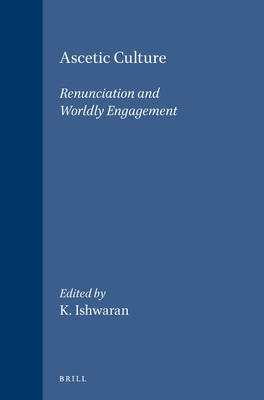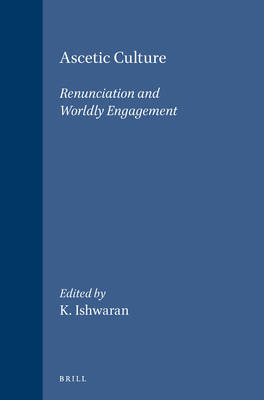
- Retrait gratuit dans votre magasin Club
- 7.000.000 titres dans notre catalogue
- Payer en toute sécurité
- Toujours un magasin près de chez vous
- Retrait gratuit dans votre magasin Club
- 7.000.0000 titres dans notre catalogue
- Payer en toute sécurité
- Toujours un magasin près de chez vous
Ascetic Culture
Renunciation and Worldly Engagement
129,95 €
+ 259 points
Description
The collection of papers in Ascetic Culture: Renunciation and Worldly Engagement was entirely conceived and developed by K. Ishwaran, who died in June 1998. The original concept was to focus on "Tradition and Innovation in Monastic Life in South Asia", a topic which combined two of Ishwaran's major interests: comparative studies of the monastic systems of south Asia, and criticism of Western anthropological and sociological assumptions of tradition and modernity being antithetical, especially with regard to traditional religions.
Ishwaran saw this collection of papers as reinforcing the "demise of universalistic projects, all encompassing grand master narratives and similar globally integrative, theoretical or empirical enterprises in social discourse" flowing from the post-structural and post-modernist revolutions in the social sciences. Later he conceived of broadening this topic to be more liberally comparative, to include major religious traditions around the world. The new title was to be "Tradition and Modernity in Monastic orders in Contemporary Societies". Finally, he broadened the theme to the present title of his collection.
Taken together, the articles appearing in this book strongly support Ishwaran's theses. First, is the obvious point that eremitism and asceticism are far more complex than commonly understood in the scholarly world. If ever a general understanding of these interrelated phenomena is developed, careful examination not only how they are found in these cultures and traditions but also study of their particular manifestations in individual movements, places, cultures, social groups etc. must take place. The second thesis is clearly established by the range of these papers: ascetic traditions are not only inimical to modernity, they may be found at the heart of certain contemporary social and cultural developments.
K. Ishwaran has rendered the study of religion in particular and the social sciences in general an important service with this anthology.
Contributers are John E. Cort, Alan Davies, Balkrishna G. Gokhale, Daniel Gold, Shaman Hatley, Sohail Inayatullah, Klaus K. Klostermaier, David Miller, S.A. Nigosian, Jordan Paper, and Earle H. Waugh.
Ishwaran saw this collection of papers as reinforcing the "demise of universalistic projects, all encompassing grand master narratives and similar globally integrative, theoretical or empirical enterprises in social discourse" flowing from the post-structural and post-modernist revolutions in the social sciences. Later he conceived of broadening this topic to be more liberally comparative, to include major religious traditions around the world. The new title was to be "Tradition and Modernity in Monastic orders in Contemporary Societies". Finally, he broadened the theme to the present title of his collection.
Taken together, the articles appearing in this book strongly support Ishwaran's theses. First, is the obvious point that eremitism and asceticism are far more complex than commonly understood in the scholarly world. If ever a general understanding of these interrelated phenomena is developed, careful examination not only how they are found in these cultures and traditions but also study of their particular manifestations in individual movements, places, cultures, social groups etc. must take place. The second thesis is clearly established by the range of these papers: ascetic traditions are not only inimical to modernity, they may be found at the heart of certain contemporary social and cultural developments.
K. Ishwaran has rendered the study of religion in particular and the social sciences in general an important service with this anthology.
Contributers are John E. Cort, Alan Davies, Balkrishna G. Gokhale, Daniel Gold, Shaman Hatley, Sohail Inayatullah, Klaus K. Klostermaier, David Miller, S.A. Nigosian, Jordan Paper, and Earle H. Waugh.
Spécifications
Parties prenantes
- Editeur:
Contenu
- Nombre de pages :
- 168
- Langue:
- Anglais
- Collection :
- Tome:
- n° 73
Caractéristiques
- EAN:
- 9789004114128
- Date de parution :
- 11-06-99
- Format:
- Livre broché
- Format numérique:
- Trade paperback (VS)
- Dimensions :
- 160 mm x 242 mm
- Poids :
- 303 g

Les avis
Nous publions uniquement les avis qui respectent les conditions requises. Consultez nos conditions pour les avis.





